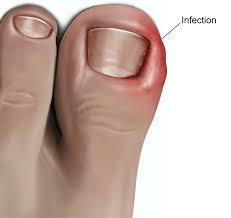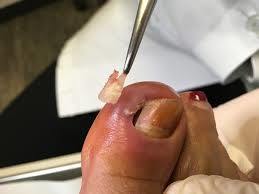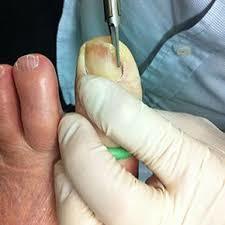Ingrown Nail Treatment & Surgery - Partial Nail Avulsion (PNA) Surgery Liverpool

Liverpool Podiatry specialise in the treatment and management of ingrown toenails.
Toenails protect our toes, but can cause severe pain if they grow into the tissue surrounding the nail. Most commonly the big toe is affected.
Symptoms:
The tissue around the nail may become inflammed, hot, red, painful to the touch and sometimes there may be pus present .
The pain becomes worse as the nail grows further into the toe and infection spreads.

What causes them?
- Poor cutting technique – nails should be cut along the contour of the toe or straight across.
- Don’t pull, rip at the nails or cut down the sides.
- Poorly fitting footwear – tight shoes may lead to pressure on the skin surrounding the nail plate
- Involuted nails – the nail plate may be excessively curved due to trauma, genetics or a bony growth under the nail bed
Treatment:
Podiatrists manage this painful condition conservatively with regular general treatments or permanent nail surgery.
Conservative measures include removal of the nail spicule, advice on appropriate footwear and correct nail cutting techniques if these issues have proven to be contributing to the ingrown toenails.
Ingrown Toenail Surgery- Partial Nail Avulsion Surgery (PNA)
We can provide a more permanent solution with partial nail removal. Using phenol under local anaesthetic we burn the nail matrix on the side of the ingrown nail, preventing nail growth and stopping painful ingrown nails once and for all.
Partial Nail Avulsion Surgery ( PNA)
This permanent procedure is most commonly performed on the big toes, but can be done on any of the lessor toes. Usually only a small section (2mm) of the nail needs to be removed, not the entire toenail. Toe nail surgery is considered a minor procedure and patients are surprised at how pain free they are after the nail surgery.
Toenail Surgery involves numbing the toe with local anaesthetic so that the procedure can be performed pain-free. A tourniquet is applied to the toe while the ingrown section of the nail is removed, along with the nail root (matrix). The root area is then cauterised with phenol so that this side of the nail does not grow back and is perminatly removed. There is no cutting of the skin so no stitches involved in the surgery, meaning less pain post op.
The area takes approximately 3-4 weeks to heal completely and at this stage the skin closes up and the nail appears quite normal.
Post op- it is important to keep the wound clean and dressed. Avoid swimming and sports until the wound is completely healed. Very rarely do people need to take time off work after the surgery. Any pain after the surgery can be managed with paracetamol.

PNA (nail surgery)
A very effective permanent solution for ingrown toenails and has a 95% success rate.
A PNA is not normally performed the first time you see the Podiatrist, they will asses your suitability for nail surgery and discuss it in detail with you at your first visit. Conservative treatment is sometimes attempted first before considering the surgery, depending on the individual case and the severity of the ingrown.
Make a general treatment appointment today, we will implement a treatment plan to fix those ingrown nails once and for all.
